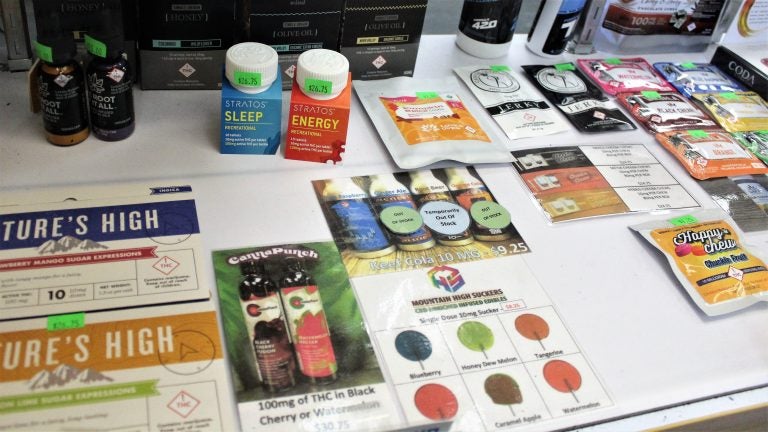N.J. employers search for straight answers on cannabis in the workplace
Medical marijuana raises more questions than answers about drug tests and employee rights, while full-blown legalization seems like an invitation to lawsuits and court cases.

The bottles that say Stratos are capsules filled with cannabis for a sleeping or for energy. (Bill Barlow for WHYY)
Business leaders have a lot of questions about how to handle employee issues that may crop up with the expansion of the state’s medical marijuana program and the possibility of full legalization.
For instance, can employees use cannabis in the workplace if it’s prescribed by a doctor? Can employers still require drug tests and are they even useful anymore? What if employees are drug-impaired but have a doctor’s authorization to use cannabis?
“The advice that I’ve been giving employers is ‘just stay calm,’” said Laura Link, a cannabis attorney at Archer Law. She was speaking to businesspeople at the New Jersey Business & Industry Association’s panel event “The Cannabis Economy: Are You Ready?” in East Windsor Wednesday morning.
“There’s no reason for us to believe that because the medical program is expanding and because we’re considering legalization of adult use on the state level, that all of a sudden people who came to work sober every day are going to start coming to work impaired.”
Link’s advice notwithstanding, the New Jersey statute covering medical marijuana and proposed for legalized recreational use does not answer such questions. There are substantial gray areas in the law that will need to be clarified either in the State House, where the legislation is currently being debated, or in state court as issues arise. It could mean years of court battles ahead.
Cannabis on the job: yes, no, maybe
Even as New Jersey’s laws begin to shift, cannabis is still classified as a Schedule I substance under federal law and is illegal to use, even for medical purposes. Those whose jobs are subject to federal regulation cannot use marijuana at work or have traces in their system. In those cases, Link said, national law trumps state laws.
New Jersey’s medical marijuana law, however, does let individuals with a valid prescription purchase and consume cannabis legally. But the statute says nothing about requiring employers to allow it in the workplace. In fact, the law’s language states that no employer is required to accommodate even those with a valid medical cannabis ID card from the New Jersey Department of Health. Employees found to be using cannabis at work can be fired — card or no card.
Where things get muddy, the panelists said, are situations in which an employee uses medical cannabis outside of the workplace on their own time and later tests positive at work. Marijuana drug tests are still imprecise and do not tell employers when cannabis was used or if there’s enough in someone’s system for them to be considered impaired.
Link said best practice in this case, is to treat cannabis like other impairing — but legal — drugs like Percocet: If an employer notices significant signs of intoxication or dangerous behavior, they should document it and keep that employee from doing anything dangerous, like operating machinery.
But some business owners noted that the laws dictating when drug tests can be given are also unclear.
Who can test — and when
As a rule, employers will still be able to drug-test applicants and employees, and no amount of medical expansion or recreational legalization will likely alter that. However, in a 2016 OSHA rule change, employers are now prevented from carrying out blanket drug testing after workplace incidents. The new rule declared that there must be some suspicion that impairment led to the accident in order to drug-test an individual.
Much of the guidance on how to navigate cannabis testing in the workplace comes from a federal court case argued in Camden in August 2018. Judge Robert Kugler ruled in Cotto v. Ardagh Glass Packing Inc. that employers are not required to waive mandatory drug testing for any employee who is a medical marijuana patient. The plaintiff in that case, who used medical marijuana, hit his head while operating a forklift and was told before he could come back to work, he would have to take a drug test. He argued he should not have to take the test because he would fail due to his prescribed cannabis. The court ruled in favor of Ardagh Glass.
The panelists on Wednesday said that employer-friendly decisions may be how the federal courts interpret state law, but it is more than likely that state courts will rule in the opposite direction in the future.
“We’re still kind of in a Wild West atmosphere when it comes to how our state’s courts are going to interpret these things,” said Leo Hurley of law firm Connell Foley. “I tend to believe the courts, based on their makeup, are going to be a bit more permissive as a general rule on this issue but that doesn’t mean there’s not going to be a fight. I think it’s something that is going to wind up being litigated to the Supreme Court.”
What’s more, private-sector employers aren’t allowed to engage in random drug testing unless the job is considered a “safety-sensitive function,” such as truck driving, police work, firefighting, or operating heavy machinery. Unfortunately, Link pointed out, there is no specific legal definition for a “safety-sensitive job” leaving many employers puzzled as to their drug-testing rights.
“I’ve heard damn good arguments that accountants should be safety-sensitive functions,” Link said. “This has been very frustrating.”
Positive tests, negative implications
But for some employers, the question isn’t when or if to drug-test, but what to do about the results. If an employee fails, should they be fired? Or never hired in the first place? And the answers to those questions could lead to lawsuits.
“I think one of the big issues here for employers is the intersection between drug use and disability and so that is really the line that we’re dealing with,” said Jonathan Ash of Fox Rothschild, attorneys at law.
If an employer asks a job applicant whether or not they have a medical cannabis card before their drug test, it could put them in a dangerous position for potential litigation: If that individual then fails the drug test and is not hired, were they discriminated against because they failed the test, or because they have an underlying medical condition?
“Once you ask that question you can’t close that box back up,” Link said.
And even if an employer believes one of their workers to be impaired on the job, they could still be setting themselves up for a potential legal challenge. Because the technology does not yet exist to reliably test for cannabis inebriation, employers are left to their own powers of observation.
“That’s a ripe litigation situation if you ask me.” Hurley said. “If we can fight out the results of a breathalyzer test, I can only imagine what the fight would be about someone’s personal observations as to impairment.”
The best bet for employers, according to the panelists, is to wait for the legislation and craft specific cannabis policies for their businesses accordingly.
Hurley said that as the state progresses “in this rapidly developing area of recreational and legalized marijuana,” employers will need to “be mindful of how the law develops in that regard and know that it can change on a dime.”
WHYY is your source for fact-based, in-depth journalism and information. As a nonprofit organization, we rely on financial support from readers like you. Please give today.




